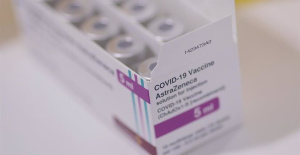The design of the advance payment system for service stations is one of the possible reasons
MADRID, 7 Jul. (EUROPA PRESS) -
The service stations have responded to the discount of 20 cents per liter of fuel approved by the Government and in force since last April 1 with an average price increase of between 0.7 cents per liter in the case of gasoline and 3.52 cents for diesel, according to a study by Esade.
"In both products, the gas stations with the lowest prices are the ones that have reacted much more strongly to the change in policy, increasing their prices. This has meant a compression of the price distribution. Specifically, in the case of diesel, the gas stations cheaper ones even increased their price between five and eight cents per litre", reveals the report.
In addition, independent gas stations, those without an exclusive supply contract with a wholesale oil product operator, are the ones that have captured most of the bonus, while retail distributors (which are part of the network of large companies) have done so to a lesser extent.
The main hypothesis used by the authors of the study is that this situation is due to "a design flaw" in the Executive's measure with respect to independent service stations.
"The system of advances implemented by the Government to provide liquidity to the sector has proved insufficient in the case of independent gas stations with lower prices, which has led to their prices increasing in order to guarantee said liquidity," the analysis points out. .
Along these lines, the authors consider that the large companies "can afford to carry out this strategy of not raising prices, or even lowering them slightly in the case of gasoline 95" given that they have the margins of their refining activities as well as the Previous higher prices compared to independent service stations.
"This relative cheapening of gas stations operated by wholesale operators compared to the rest of the market seems to us to be particularly worrying in the medium and long term, since we understand that it can undermine competition in the sector," warns the report.
Since the Government's intention to subsidize fuel was announced, one of the main points of friction with the service station sector was linked to the advances that the gas stations should receive.
In fact, still at the end of June, the National Association of Automatic Service Stations (Aesae) asked the Executive to speed up the payments of the advance amounts so as "not to endanger the financial stability of the gas stations that operate in Spain."
Aesae states that, according to its calculations, the gas stations are advancing around 35,000 euros per month, "which represents a significant decrease in their liquidity and, in many cases, by not having it, a search for external financing in financial entities" , which results in indebtedness and financial costs for which they do not receive consideration.
In this context, Esade's proposal consists of "extending and improving the design of the advance payment system to independent service stations" to ensure that they do not need to resort to price increases to have short-term liquidity.
Thus, they point to the possibility of extending the system of advances and that returns are made more frequently, every fifteen days, replacing the current model, where it is made monthly.
"We understand that in this way the liquidity of small companies in the sector is guaranteed, which will help the discount reach consumers in its entirety without increasing the level of aggregate spending of the policy," the report includes among its conclusions.
The average price of diesel in Spain registered a new historical record last week, reaching 2.1 euros per liter, while that of gasoline fell slightly, which does not prevent both fuels from consolidating above two euros per liter, a level that has been exceeded for several weeks if the bonus is not taken into account.
However, including it, the average price of a liter of gasoline last week was 11 cents more expensive than in the last week of March (1,818 euros), before the discount began to be applied, with which the increase in prices registered for this fuel since then it has fully absorbed the aid.
In the case of diesel, when applying the reduction of 20 cents per liter, its amount would be about six cents higher than the price it marked at the end of March (1,837 euros per liter).
In fact, fuel price levels in Spain have consolidated above the average of the countries of the European Union and the Eurozone since the measure came into force, when before it they were traditionally below the average.

 Exploring Cardano: Inner Workings and Advantages of this Cryptocurrency
Exploring Cardano: Inner Workings and Advantages of this Cryptocurrency Seville.- Economy.- Innova.- STSA inaugurates its new painting and sealing hangar in San Pablo, for 18 million
Seville.- Economy.- Innova.- STSA inaugurates its new painting and sealing hangar in San Pablo, for 18 million Innova.- More than 300 volunteers join the Andalucía Compromiso Digital network in one month to facilitate access to ICT
Innova.- More than 300 volunteers join the Andalucía Compromiso Digital network in one month to facilitate access to ICT Innova.-AMP.- Ayesa acquires 51% of Sadiel, which will create new technological engineering products and expand markets
Innova.-AMP.- Ayesa acquires 51% of Sadiel, which will create new technological engineering products and expand markets AstraZeneca admits that its Covid vaccine can cause side effects such as thrombosis in "very rare cases"
AstraZeneca admits that its Covid vaccine can cause side effects such as thrombosis in "very rare cases" The PP signs the director of the cabinet of the governor of the Bank of Spain for its list for the European elections
The PP signs the director of the cabinet of the governor of the Bank of Spain for its list for the European elections Illa does not rule out agreeing with Junts after the Catalans if they do not prioritize independence
Illa does not rule out agreeing with Junts after the Catalans if they do not prioritize independence Los Angeles Police begin to dismantle the encampment at the University of California
Los Angeles Police begin to dismantle the encampment at the University of California How Blockchain in being used to shape the future
How Blockchain in being used to shape the future Not just BTC and ETH: Here Are Some More Interesting Coins Worth Focusing on
Not just BTC and ETH: Here Are Some More Interesting Coins Worth Focusing on UPV students design an app that helps improve the ventilation of homes in the face of high temperatures
UPV students design an app that helps improve the ventilation of homes in the face of high temperatures Ivace and promotes a less invasive device for the early detection of prostate cancer
Ivace and promotes a less invasive device for the early detection of prostate cancer Valencia unanimously approves the ordinance to allocate spaces to test innovative initiatives
Valencia unanimously approves the ordinance to allocate spaces to test innovative initiatives UPV researchers promote a paid master's degree as a "talent factory" in integrated photonics
UPV researchers promote a paid master's degree as a "talent factory" in integrated photonics A million people demonstrate in France against Macron's pension reform
A million people demonstrate in France against Macron's pension reform Russia launches several missiles against "critical infrastructure" in the city of Zaporizhia
Russia launches several missiles against "critical infrastructure" in the city of Zaporizhia A "procession" remembers the dead of the Calabria shipwreck as bodies continue to wash up on the shore
A "procession" remembers the dead of the Calabria shipwreck as bodies continue to wash up on the shore Prison sentences handed down for three prominent Hong Kong pro-democracy activists
Prison sentences handed down for three prominent Hong Kong pro-democracy activists ETH continues to leave trading platforms, Ethereum balance on exchanges lowest in 3 years
ETH continues to leave trading platforms, Ethereum balance on exchanges lowest in 3 years Investors invest $450 million in Consensys, Ethereum incubator now valued at $7 billion
Investors invest $450 million in Consensys, Ethereum incubator now valued at $7 billion Alchemy Integrates Ethereum L2 Product Starknet to Enhance Web3 Scalability at a Price 100x Lower Than L1 Fees
Alchemy Integrates Ethereum L2 Product Starknet to Enhance Web3 Scalability at a Price 100x Lower Than L1 Fees Mining Report: Bitcoin's Electricity Consumption Declines by 25% in Q1 2022
Mining Report: Bitcoin's Electricity Consumption Declines by 25% in Q1 2022 Oil-to-Bitcoin Mining Firm Crusoe Energy Systems Raised $505 Million
Oil-to-Bitcoin Mining Firm Crusoe Energy Systems Raised $505 Million Microbt reveals the latest Bitcoin mining rigs -- Machines produce up to 126 TH/s with custom 5nm chip design
Microbt reveals the latest Bitcoin mining rigs -- Machines produce up to 126 TH/s with custom 5nm chip design Bitcoin's Mining Difficulty Hits a Lifetime High, With More Than 90% of BTC Supply Issued
Bitcoin's Mining Difficulty Hits a Lifetime High, With More Than 90% of BTC Supply Issued The Biggest Movers are Near, EOS, and RUNE during Friday's Selloff
The Biggest Movers are Near, EOS, and RUNE during Friday's Selloff Global Markets Spooked by a Hawkish Fed and Covid, Stocks and Crypto Gain After Musk Buys Twitter
Global Markets Spooked by a Hawkish Fed and Covid, Stocks and Crypto Gain After Musk Buys Twitter Bitso to offset carbon emissions from the Trading Platform's ERC20, ETH, and BTC Transactions
Bitso to offset carbon emissions from the Trading Platform's ERC20, ETH, and BTC Transactions Draftkings Announces 2022 College Hoops NFT Selection for March Madness
Draftkings Announces 2022 College Hoops NFT Selection for March Madness



























